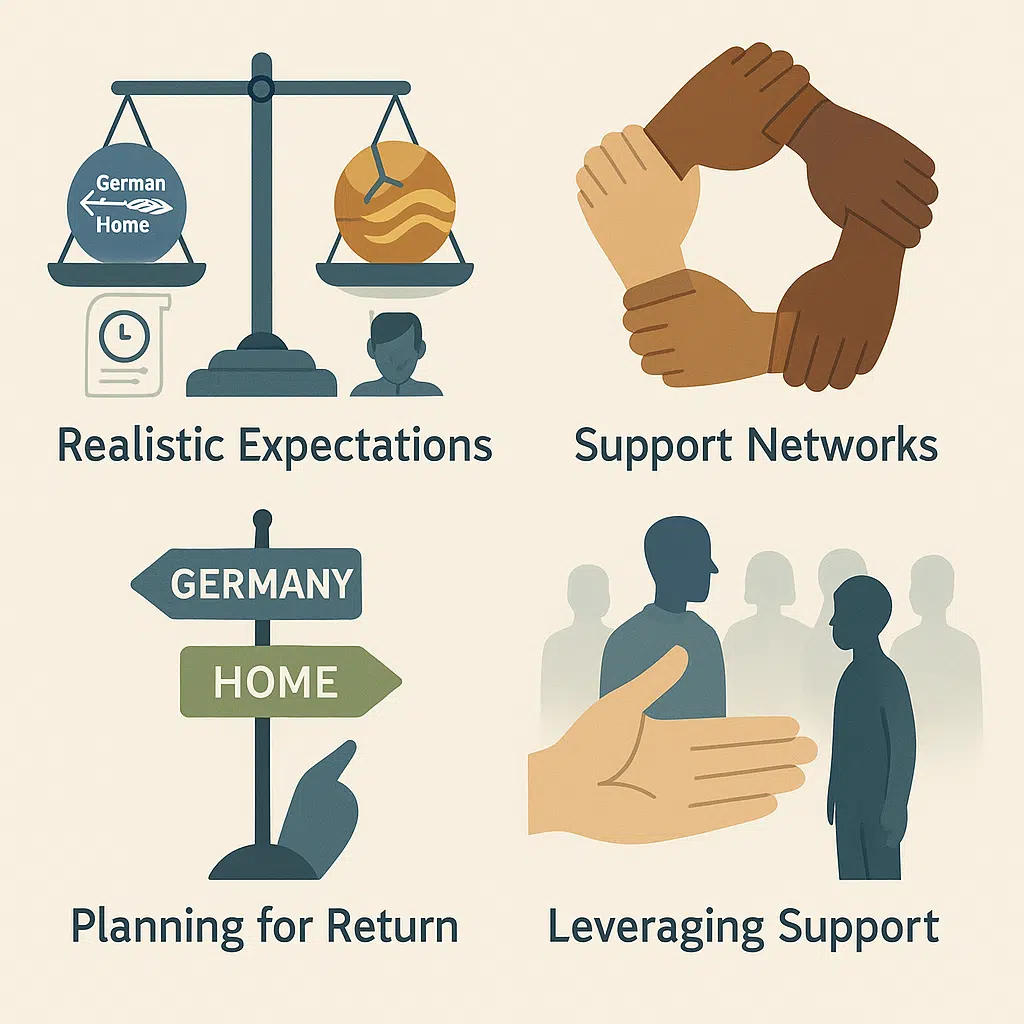
Moving to Germany can feel like stepping into a promising new chapter. But for many, that excitement fades fast. A recent study shows that one in four immigrants plans to leave Germany, citing reasons like endless bureaucracy, subtle (and not-so-subtle) discrimination, language barriers, and limited career growth. Understanding why Immigrants Leaves Germany is crucial for expats.
Add to that a lack of clear, English-language guidance, and it’s easy to see why some expats feel stuck or even unwelcome.
But leaving isn’t the only option.
This guide is here to unpack why so many newcomers struggle, and more importantly, how you can avoid the common pitfalls. Whether you’re navigating your visa, job market challenges, or just daily life in a new culture, we’ll offer grounded advice to help you not just survive in Germany, but thrive.
Seit Jahrzehnten verfestigt sich ein dramatischer Trend: Immer mehr Deutsche verlassen das Land, die Einwanderung ins Land hingegen setzt sich beständig fort.https://t.co/uz8WDZkTMk pic.twitter.com/wJqsQ14YkV
— NIUS (@niusde_) June 25, 2025
2. Key Drivers of Immigrant Departure

Why do so many immigrants give up on Germany? A growing number of studies and surveys paint a clear picture: the daily hurdles aren’t just frustrating, they’re pushing people out.
Many factors contribute to the decision of why Immigrants Leaves Germany, impacting the lives of those who relocate.
According to recent findings, 25% of immigrants in Germany say they plan to leave. The reasons? They tend to fall into three major categories:
1. Bureaucracy Hurdles
From visa renewals to registering an address or opening a bank account, newcomers often find themselves lost in layers of paperwork.
Even simple tasks can involve long waits, multiple appointments, and forms that are only available in German. One report found that nearly 60% of departing immigrants cited bureaucracy as a primary reason for considering relocation.
2. Workplace Culture
Even after landing a job, many immigrants report hitting a ceiling. Some face subtle exclusion in the office. Others encounter outright bias in hiring or promotion.
A lack of diversity in leadership, limited recognition of international qualifications, and limited support for professional growth can leave highly skilled workers feeling overlooked or underutilized.
3. Social Integration Challenges
Life outside work can feel just as isolating. Many expats say it’s hard to build friendships with locals, especially in smaller towns or more traditional settings.
Limited community programs, language barriers, and cultural differences often lead to feelings of loneliness and a longing for home.
While these issues are real, they’re not unbeatable. The next sections will look at how you can work through them and find your place in Germany.
A recent survey suggests that 1 out of 4 immigrants in Germany is thinking about leaving the country. pic.twitter.com/E0B2BL9p0R
— DW News (@dwnews) June 20, 2025
3. Practical Strategies for Navigating German Systems
Adjusting to life in Germany means learning to work with a system that can feel rigid and confusing, especially at first. But with the proper steps, it gets easier. Here’s how to tackle the basics with confidence:
Healthcare: Registering & Finding English-Speaking Doctors
Step 1: Choose your insurance
- Public insurance (gesetzliche Krankenversicherung) is the standard for most employees. Providers like TK, AOK, and Barmer are popular.
- Private insurance may be an option if you’re self-employed or earning above a certain threshold.
Step 2: Register after arrival
Once you’ve got your residence registration (Anmeldung, see below), you can sign up with your chosen insurer. They’ll mail you a health insurance card.
Step 3: Find English-speaking doctors
- Use platforms like Doctolib or Jameda and filter for “Englisch” under language.
- Look for practices in university cities, doctors there often speak multiple languages.
Anmeldung: Residence Registration
This is your official proof of living in Germany, and it’s required for nearly everything, getting health insurance, opening a bank account, or applying for a visa.
How to register:
- Book an appointment at your local Bürgeramt (citizen’s office). Some cities allow walk-ins, but appointments are safer.
- Bring your passport, rental contract, and a Wohnungsgeberbestätigung (signed form from your landlord confirming you live there).
- After registering, you’ll receive a Meldebescheinigung; keep it safe.
Tip: Book your appointment early, even before you arrive, if possible. Slots fill up quickly in major cities.

Housing: Finding a Place to Live
Germany’s housing market can be challenging, especially in cities like Berlin, Munich, or Frankfurt. But persistence pays off.
Where to look:
- WG-Gesucht.de: Ideal for shared apartments (WGs) and short-term stays.
- Immobilienscout24.de: Best for long-term rentals and private apartments.
- Facebook groups: Many expat and local rental communities post listings.
Tips for success:
- Write a short, friendly intro in German (even if using Google Translate).
- Have your documents ready: proof of income, passport copy, SCHUFA (credit report), and Anmeldung if available.
- Consider temporary accommodation or relocation services for your first few weeks; some agencies even help with Anmeldung and translation.
These systems can feel overwhelming at first, but once you’ve checked off these basics, daily life becomes much smoother. Up next: how to build a stronger social and professional life in Germany.
4. Combating Isolation Through Community Channels
Moving abroad can be exciting, but it can also feel lonely. Many immigrants in Germany say that social isolation is one of the most complex parts of settling in. The good news is you’re not alone, and there are real ways to build lasting connections.
Join local clubs (Vereine). Whether you’re into football, photography, language exchange, or hiking, there’s likely a club for you. It’s also a great way to practice your German in a relaxed setting. You can search online for “[your interest] + Verein + [your city]” or ask at your local community center (Bürgerhaus) or university. Many clubs welcome beginners or offer English-speaking options.
Attend expat meetups and cultural events. In bigger cities like Berlin, Hamburg, and Munich, events are regularly held to bring people together, from casual coffee chats to networking nights—platforms like InterNations and Meetup list many of these. Cultural centers, embassies, and city festivals also host public gatherings where you can meet locals and fellow newcomers.
Use online platforms to connect. If you’re not ready to go out just yet, start online. Join Facebook groups like “Expats in [City]” or “English Speakers in Germany.” Explore Meetup events or use apps like Bumble BFF and Tandem to find language partners or friends.
Take small steps and be patient. Building a new social circle takes time, but even small efforts can make a big difference. Many expats say that once they found their community, Germany started to feel like home.
Next up: how to thrive long-term by adapting and setting realistic expectations.
5. Proactive Tips for Expats

Thriving in Germany isn’t just about solving problems; it’s about preparing wisely, staying flexible, and knowing where to turn when things get tough. These strategies can help you stay one step ahead and make the most of your time abroad.
Set Realistic Expectations
Cultural differences can catch newcomers off guard. Prepare for:
- Direct communication: Germans tend to be honest and to the point. It’s not rudeness, it’s clarity.
- Work-life balance: The idea of Feierabend (shutting off work at the end of the day) is deeply valued. Don’t expect round-the-clock replies.
- Punctuality and rules: Being on time and sticking to processes are part of daily life; embrace them, and things flow more smoothly.
Understanding the “why” behind cultural habits can reduce frustration and help you adapt faster.
Leverage Support Networks
You don’t have to do it alone. There are people and services ready to help:
- Friends and colleagues: Don’t hesitate to ask locals for help with forms, translations, or cultural tips.
- Language schools: Enrolling in a German course is one of the fastest ways to gain independence and meet others in the same boat.
- Relocation services and community orgs: These can help with paperwork, housing, and even social integration.
The earlier you build a support network, the stronger your foundation will be.
Plan for the Possibility of Return
It’s okay if Germany isn’t forever. Many expats decide to return home for family, work, or personal reasons.
- Keep your CV and references up to date in both English and German
- Maintain professional contacts in your home country
- Reflect regularly on your long-term goals. Where do you see yourself in 1, 3, or 5 years?
Being open to all possibilities, staying, moving, or returning, gives you freedom and peace of mind.
Living in Germany is full of opportunity, but it requires effort, patience, and planning. With the right mindset and support, you can turn the challenges into stepping stones and create a life that feels truly your own.
6. Perspective-Focused Value for Long-Term Expats
Staying in Germany long-term brings stability, but it can also lead to burnout, frustration, or homesickness over time. That’s why it’s important to stay grounded and keep your energy and curiosity alive, even years after you arrive.
Prioritize self-care and balance. Many long-term expats feel pressure to keep adapting without pause. But it’s essential to check in with yourself. Make time for hobbies you genuinely enjoy, not just productive goals. Embrace the Feierabend culture by switching off from work and enjoying your evenings. Spend time outdoors in parks, forests, or on weekend trips; it’s part of the German way of life. And most importantly, don’t bottle up stress. Talking with friends or an expat counselor can
Stay informed about what’s changing around you. Immigration rules, tax laws, and job markets evolve regularly in Germany. Staying up to date helps you avoid surprises. Check resources like Make it in Germany, BAMF, or your local Ausländerbehörde for official updates. Follow job trends on LinkedIn, StepStone, or Glassdoor Germany. If you’re thinking about permanent residency or citizenship, be aware of eligibility requirements and any changes in processing times. Knowledge keeps you confident and prepared.
Long-term success in Germany isn’t about perfection. It’s about staying flexible, looking after yourself, and continuing to engage with your life here. You’ve already come a long way, and that’s something to be proud of.
7. Conclusion
Why are immigrants leaving Germany? A new study shows that other countries are more attractive to economically successful foreigners. Discrimination also plays a major role.https://t.co/N6SNqOpHHG
— DW News (@dwnews) June 17, 2025
Germany isn’t always the easiest place to start fresh. Many immigrants face numerous challenges, including endless bureaucracy, workplace barriers, and the loneliness that often comes with starting over.
But as we’ve seen, those struggles aren’t the end of the story.
You can navigate the system.
You can build a community.
And you can create a life that works for you here, with a bit of planning, support, and persistence.
From mastering the Anmeldung to joining a local club or finding a support network that gets it, you’ve now got a roadmap. Whether you’re staying for a year or putting down roots long-term, these tips can help you feel more at home, one step at a time.
Have your own experience to share?
Drop a comment below, we’d love to hear what helped you settle in, what surprised you, or what you wish you’d known earlier. Let’s help the next wave of expats feel a little less alone.
Your story might be exactly what someone else needs.

Frequently Asked Questions (FAQ)
1. How long does the Anmeldung process take?
Appointments can be booked weeks in advance, and the registration itself takes about 15–20 minutes once you’re there. You’ll receive your registration certificate (Meldebescheinigung) either immediately or by post.
2. Do I need to speak German to thrive in Germany?
While it’s possible to get by in big cities with English, learning basic German significantly improves job options, integration, and everyday life. Language schools, apps like Duolingo, and integration courses can help.
3. Can I switch from public to private health insurance?
Yes, but only under certain conditions, like if you’re self-employed or earning above a specific income threshold (€69,300 in 2025). Switching back to public insurance can be difficult, so weigh your options carefully.
4. What’s the best way to meet people as an expat?
Start with expat Meetup groups, join a Verein (club), attend language courses, or try online platforms like Internations and Facebook groups for your city.
5. What support is available for expat families?
Families can access public childcare (Kita), family benefits like Kindergeld, and local parenting networks. Each federal state may have its resources; ask at your city’s Welcome Center or town hall.
6. What happens if I decide to leave Germany?
Make sure to deregister (Abmeldung) from your address, settle taxes, cancel contracts, and close bank accounts. Planning early helps avoid legal or financial complications later.

